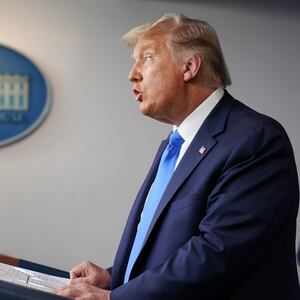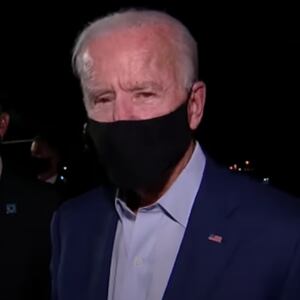In the closing months of his first term in office, President Donald Trump has taken the public approach of a wannabe authoritarian, but with the private perspective of a MAGA internet troll.
Over the past week, Trump declined to commit to a peaceful, orderly transition of power, no matter who wins the 2020 presidential election, declaring at one point, “We’re going to have to see what happens.”
To horrified voters, onlookers, and the Democratic opposition, it was another clear instance of the sitting president openly telegraphing his plans to seize power, something some administration officials fear will soon take form within the federal government and among major party organs.
But to Trump, it was… funny as hell.
According to two people familiar with the matter, hours after the president stepped away from the cameras, Trump continued following the fallout in the press, including on cable news, and began privately remarking how amusing it was that his answer was making media and liberal heads explode, and also predictably dominating TV coverage.
“He seemed to get a real kick out of it,” one of the sources said, adding that the president seemed to relish making the press, in Trump’s words, “go crazy” over his non-commitment to democratic norms and procedure. “[The president] wasn’t going to be playing by their rules on this just to make them feel comfortable.”
One senior White House official cautioned that they had no direct knowledge of the president laughing off the matter. But among longtime Trump hands, the idea of him basking in the shit storm of his creation was entirely expected.
“Trump is just being Trump, and people are playing right into his hands,” said Stuart Jolly, who served as national field director for Trump’s 2016 presidential run. “The media always takes the bait.”
Outside the confines of Trumpland, few were laughing. Some of the president’s own former senior administration officials said they were appalled by the comments, finding them both utterly believable indications of intent and further evidence that the man they once served wasn’t just unfit for office but a threat to public safety.
“I continue to be concerned that the president’s reckless rhetoric will incite violence from fringe extremists,” said Elizabeth Neumann, a former assistant secretary at the Department of Homeland Security for counterterrorism and threat prevention who has since endorsed Joe Biden. “All leaders must understand how precarious a moment we are in, which has been noted by multiple law enforcement and intelligence briefings. They have a responsibility to be careful with their words.”
By Thursday, some GOP lawmakers on Capitol Hill were busy gently subtweeting President Trump, or more aggressively both-sides-ing the issue. But in some corners of the administration, various officials and law enforcement personnel have indeed begun to view the threat of a constitutional crisis with alarm.
According to a Justice Department prosecutor, there is internal concern in some department circles that Attorney General William Barr will join post-election lawsuits on behalf of the Trump campaign or its allies. The prosecutor had no inside information about this, and described it instead as an expectation amongst some Justice Department personnel who consider Barr dangerous.
They noted that Barr has already steered the Justice Department to aid Trump against efforts to subpeona his tax returns and against rape accusations from E. Jean Carroll. That’s on top of Barr’s abandonment of the prosecution of Trump ally Mike Flynn and revised sentencing recommendations for Trump ally Roger Stone, to say nothing of Barr’s infamous misrepresentation of the Mueller report.
This month, Barr invented a fraud claim involving mail-in voting, echoing Trump’s deceptive depiction of it as a vector for election theft, and urged police to consider charging protesters with sedition. This week, Barr warned New York City, Portland, and Seattle that as “anarchist” jurisdictions, they risked federal funding; criteria for designation include “factors the Attorney General deems appropriate.”
A Justice Department spokesperson didn’t respond to a request for comment.
Any Justice Department intervention in election-related lawsuits would have “tremendous practical effect,” the prosecutor said. In addition to the quality of its lawyering—particularly within the solicitor-general’s office, should any case reach the Supreme Court—the attorneys hold prestige in federal appellate courts. Appointing a ninth Supreme Court justice to fill the seat held by the recently deceased Ruth Bader Ginsberg would likely act as a firewall should crucial election decisions reach the high court—something Trump and his vice president have mused about openly.
Barbara McQuade, a former U.S. attorney, pointed to a recent Michigan case in which private businesses sued Gov. Gretchen Whitmer for her stay-at-home pandemic orders. The Justice Department filed a “statement of interest” to get involved, something McQuade observed was an option for election-related lawsuits in various states.
“If [the Justice Department] were to adopt the same side as the president, he would have behind him the credibility of the U.S. government, as well as an unlimited supply of very talented lawyers,” McQuade said.
On Thursday morning, FBI Director Chris Wray testified to a Senate panel that there was no evidence of widespread voter fraud, by mail or otherwise. But hours later, the Justice Department issued, deleted, and then reissued a statement announcing an investigation into “reports of potential issues with a small number of mail-in ballots” in Pennsylvania’s Luzerne County, which went strongly for Trump in 2016. Underway since Monday, the inquiry determined that a “small number” of military ballots were discarded, it said without elaboration.
Of nine recovered ballots, seven contained Trump votes while two had an undetermined candidate preference, the Justice Department said in a statement attributed to U.S. attorney David Freed that initially said all nine ballots were cast for Trump. “When completed ballots arrive in the mail, they are supposed to be immediately sorted and placed inside the locked room,” reported Jerry Lynott and Jennifer Learn-Andes of the Times-Leader.
The statement seemed, to many observers, like a trial run for the department to further involve itself in election-related matters. And McQuade said the “highly unusual statement” violated department policies against confirming investigations.
“There is an exception if necessary to assure the public,” she said, “but this seems more of an effort to alarm the public and undermine confidence in the election.”
Barr, warned the Justice Department prosecutor, “is without limit to what he’ll do.”









